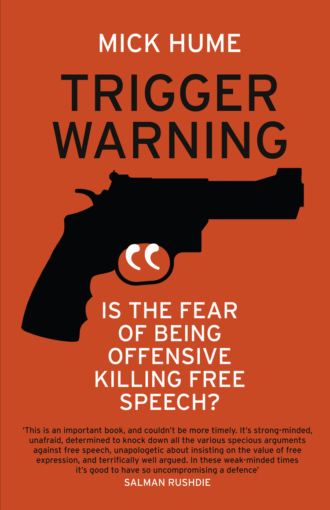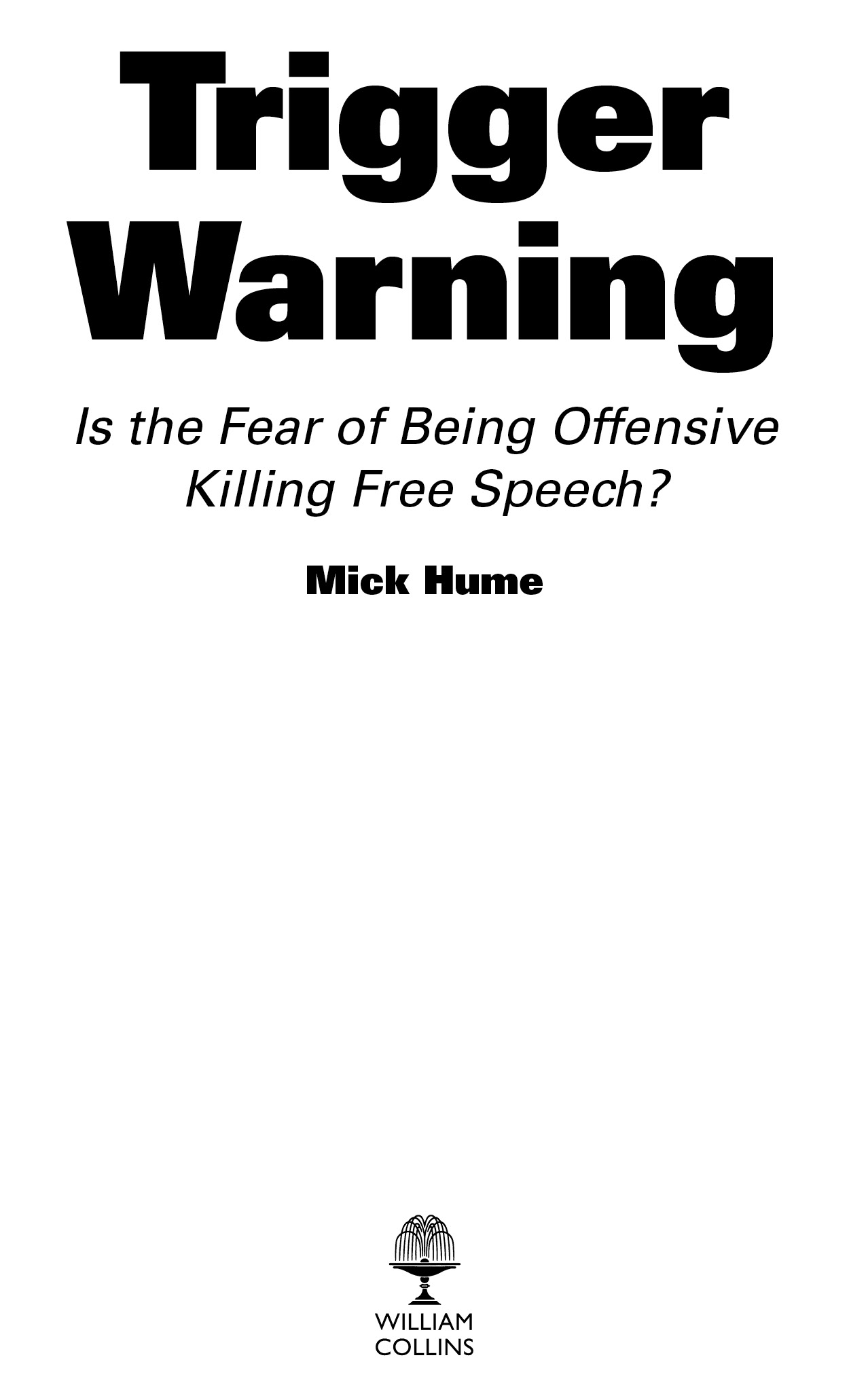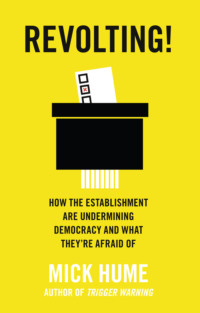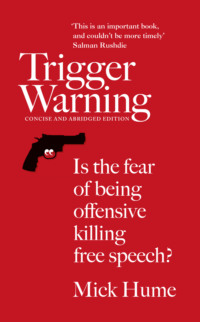
Полная версия
Trigger Warning: Is the Fear of Being Offensive Killing Free Speech?


Copyright
William Collins
An imprint of HarperCollinsPublishers
1 London Bridge Street
London SE1 9GF
www.WilliamCollinsBooks.com
This eBook first published in Great Britain by William Collins in 2015
Copyright © Mick Hume 2015
Mick Hume asserts the moral right to
be identified as the author of this work
A catalogue record of this book is
available from the British Library
All rights reserved under International and Pan-American Copyright Conventions. By payment of the required fees, you have been granted the non-exclusive, non-transferable right to access and read the text of this e-book on screen. No part of this text may be reproduced, transmitted, down-loaded, decompiled, reverse engineered, or stored in or introduced into any information storage and retrieval system, in any form or by any means, whether electronic or mechanical, now known or hereinafter invented, without the express written permission of HarperCollins.
Source ISBN: 9780008125455
Ebook Edition © May 2015 ISBN: 9780008126384
Version: 2015-05-11
Dedication
For Stella and Isabel, may they always think what they like and say what they think
Contents
Cover
Title Page
Copyright
Dedication
Epigraph
Author’s note
Prologue: ‘Je Suis Charlie’ and the free-speech fraud
SECTION ONE: The silent war on free speech
1 A few things we forgot about free speech
2 The age of the reverse-Voltaires
3 A short history of free-speech heretics
4 The Internet Front: hunting for trolls down ‘memory holes’
5 The University Front: students fight for ‘freedom from speech’
6 The Entertainment Front: football – kicking free speech with impunity; comedy – no laughing matter
SECTION TWO: Five good excuses for restricting free speech – and why they’re all wrong
7 ‘There is no right to shout “Fire!” in a crowded theatre’
8 ‘… but words will always hurt me’
9 ‘Mind your Ps, Qs, Ns and Ys’
10 ‘Liars and Holocaust deniers do not deserve to be heard’
11 ‘Free speech is just a licence for the mass media to brainwash the public’
A short summation for the defence
Epilogue: The Trigger Warnings we need
Notes
About the Publisher
Epigraph
Trigger Warning (noun): a statement at the start of any piece of writing, video, etc, alerting the reader or viewer to the fact that it contains material they might find upsetting or offensive.
Author’s note
This is not a book about the Charlie Hebdo massacre. When I began to write Trigger Warning in late 2014, Charlie was a small French satirical magazine known by relatively few and read by far fewer, particularly in the Anglo-American world. The murderous attack at the magazine’s Paris offices in January 2015 did not really alter the argument about the urgent need to defend free speech, but that massacre and the reactions to it certainly brought the issues into focus.
Two concerns had already motivated me to write this book, both of which were highlighted in the aftermath of Charlie Hebdo. The first was an awareness of the widening gap between the rhetorical, ritualistic support that Western societies pay to freedom of speech in principle, and the increasing preparedness to compromise and restrict it in practice. The sight of world political leaders declaring ‘Je Suis Charlie’, whilst simultaneously trying to outlaw opinions they found offensive, illustrated that chasm.
My second concern was that the political and cultural attacks on free speech were often being led, not by Islamist extremists, but by those in the West who would consider themselves liberal or left-minded. The flipside of this was freedom being dismissed as of interest only to right-wing cranks, accused of ‘hiding behind free speech’. As a veteran of radical struggles who still considers himself on the left, even if not of its modern incarnation, I have always understood that fighting for free speech is indispensable to those who want to argue for radical ideas and social change. When I first wrote in defence of ‘the Right to be Offensive’, twenty-five years ago, it was as the editor of Living Marxism magazine. Those opinions were in a distinct minority on the British left even then. Today, with campaigners demanding post-Charlie purges of both ‘Islamophobia’ and ‘Islamo-fascism’, the need to resist the tide and make the radical case for the right to offend is more urgent still.
This polemical book is intended as a contribution to that resistance. The case it makes for free speech has developed through years of argument as a campaigning political journalist in both the alternative and mainstream UK media. In 1988 I was the launch editor of Living Marxism, which we relaunched as the taboo-busting LM magazine in the Nineties until it was forced to close in 2000 after being sued under England’s atrocious libel laws. Then I became the launch editor of Spiked (spiked-online.com), the UK’s first and best web-based current affairs and comment magazine, of which I am now editor-at-large. I was also the only libertarian Marxist columnist at The Times (London) for ten years, and now write as a guest columnist for the Sun, among others.
The development of the arguments in the pages that follow would not, however, have been possible without the input of others. I want to recognise and thank my overworked and underpaid colleagues at Spiked, where many of these ideas first germinated and where the crisis of free speech in Anglo-American society has been brilliantly brought to light by editor Brendan O’Neill, ably backed by deputy editor Tim Black and managing editor Viv Regan. Spiked’s transatlantic ‘Free Speech Now’ campaign, especially its work to combat censorship on campus led by Tom Slater, is a model, online and off, of how to breathe new life into a dormant political principle.
I also want sincerely to thank my old friends and collaborators Frank Furedi, whose inspiration and advice was as indispensable for this book as it has been for longer than either of us might care to remember, and Michael Fitzpatrick, who first tried to teach me how to write properly more than thirty years ago, and is still trying now. Thanks are due to Martin Redfern, my editor at William Collins, for bringing the idea to fruition. And most of all to my wife, Ginny, the managing editor of all that I do, for making me start and finish writing it. The responsibility for the text, warts and all, is of course mine.
Mick Hume, London, April 2015
Prologue
‘Je Suis Charlie’ and the free-speech fraud
Free speech is threatened on two fronts: occasionally by bullets, and every day by buts.
Copenhagen, Denmark, 15 February 2015. A meeting in a café to discuss the issues of free speech and blasphemy, just over a month after the massacre at the Paris offices of the satirical magazine Charlie Hebdo. Inna Shevchenko of the Ukrainian feminist protest group FEMEN opens the panel discussion, talking about her relationship with the cartoonist Charb – Charlie Hebdo’s editor – and their shared insistence on their right to freedom of expression (FEMEN are famous for protesting topless).
Shevchenko gets to the nub of the argument: ‘I realise that, every time we talk about the activity of those people, there will always be, “Yes, it is freedom of speech, but …” And the turning point is “but”. Why do we still say “but” when we …’ At that precise moment her speech is ended by the sound of sustained gunfire from outside the meeting.1
The timing of the Islamist gunman’s attack on the Copenhagen free-speech meeting was so precise it might almost have been scripted. Just as the speaker raised the problem of people within the West saying ‘Yes it is free speech, but’ to signal the limits of their support, the murderer added his own full stop to the debate from outside by opening up with an M95 assault rifle, leaving Finn Noergaard, a Danish film-maker, dead. (The gunman later killed another man in an attack on a synagogue in the city.)
There is no equivalence, of course, between bullets and buts, between violent assaults on free speech and equivocal endorsements of it. Might it be, however, that the weakening of support for free speech in the West, signalled by the rising chorus of ‘buts’ attached to it, has encouraged those few willing to take more forceful action to put a stop to what they deem offensive?
Two crimes were committed against the satirical magazine Charlie Hebdo in January 2015.
Islamist gunmen committed mass murder at the paper’s Paris offices. They shot dead eight cartoonists and journalists, two police officers and two others, in a graphic demonstration of their hatred for freedom of speech and of the press.
Then the great and the good of Western society committed a mass free-speech fraud. They sold us the line that they all supported free speech, making rhetorical and ritualistic gestures of support for the Charlie Hebdo victims. Yet at the same time many were acting out their contempt for the real freedom of expression that allows such provocative publications to exist in the first place.
The massive ‘Je Suis Charlie’ demonstrations in Paris and many other cities, which followed the massacre and the connected murders at a Jewish supermarket, were uplifting displays of human solidarity that made an impression on us all. They also, however, gave a misleading impression of the state of play with free speech in Europe and America.
Here, it might have appeared, was a clear cultural divide: on one side, a free world united in support of Charlie Hebdo and freedom of expression; on the other, a handful of extremists opposed to liberty and ‘all that we hold dear’. Behind those solidarity banners, however, Western opinion was far less solidly for free speech. Many public figures could hardly wait to stop paying lip service to liberty and start adding the inevitable qualifications, obfuscations and, above all, ‘Buts …’
Those who took a dim view of genuinely free speech in the aftermath of Charlie Hebdo were not confined to Islamist terror cells. It quickly emerged that the threat to freedom came not just from a few barbarians at the gate. Free speech faces more powerful enemies within the supposed citadel of civilisation itself.
The moving displays of solidarity were primarily showing sympathy with the murder victims. Support for freedom of speech as embodied by the consistently offensive Charlie Hebdo was a lot less solid. It might have been more appropriate if many of those placards had named individual victims – ‘Je Suis Charb/Wolinski/Elsa’ – rather than Charlie the magazine. From the Guardian to Sky News, media outlets in the UK which expressed outrage at the murders still felt obliged to apologise for any offence caused by allowing a glimpse of the post-massacre cover of Charlie Hebdo, with its cartoon image of Muhammad.
Even before the dead had been buried, it turned out that the ‘worldwide’ support for Charlie Hebdo’s right to free speech was far from universal – and that those of a different persuasion were not confined to the hostile parts of the Islamic world.
An international consensus of a different hue quickly emerged, to agree that the Charlie Hebdo massacre showed the need to apply limits to free speech and restrict the right to be offensive. This consensus included some unusual bedfellows, notably His Holiness Pope Francis and the Communist Party of China.
Soon after condemning the murders, the Pope almost appeared to suggest that those cartoonists he called ‘provocateurs’ had been asking for it. His Holiness declared that ‘There is a limit’ to free speech, that ‘You cannot insult the faith of others. You cannot make fun of the faith of others’, and that it was ‘normal’ for those who do so to ‘expect a punch’.2
The state-run Xinhua News Agency, official voice of the Chinese Communist regime, was a couple of days ahead of the Pope in stating that ‘the world is diverse and there should be limits on press freedom’. Its editorial made clear that, for China’s authoritarian rulers, ‘unfettered and unprincipled satire, humiliation and free speech are not acceptable’.3
To which the natural response might be: ‘Is the Pope a Catholic?’ and ‘Do Red bears dump on the press?’ Nobody should have been too shocked to hear such views on punishing heretics from the head of the Church whose Inquisition condemned Galileo, or from the Chinese state hierarchy that has kept its press on the shortest leash and freedom in a noose.
More surprising was that the joint Vatican–Beijing statement setting ‘limits’ to what the likes of Charlie ought to say seemed to become the accepted party line for many in the supposedly liberal-minded West, who also want to rein in ‘unfettered satire and free speech’. No sooner had they got the niceties of paying respects to the dead out of the way than they embarked on wholesale free-speech fraud.
There were loud accusations of hypocrisy after the appearance of autocratic governments from the Middle East and Africa at the Paris ‘Je Suis Charlie’ demo. As one US professor at George Washington University tweeted, ‘Glad so many world leaders could take time off jailing and torturing journalists and dissidents to march for free expression in France.’4
Yet double standards flourished much closer to home.
The French authorities led the way, responding to the murderous assault on free speech in their capital by ordering a crackdown – on those whose speech they found offensive. The Justice Ministry sent a letter to all French prosecutors and judges ‘urging more aggressive tactics’ against suspected hate speech and those accused of defending terrorism. A week after the Charlie Hebdo attack, more than fifty people had been arrested for speech crimes.
Among those scooped up was the notorious anti-Semitic comedian Dieudonné M’bala M’bala, arrested as an alleged ‘apologist for terrorism’ after he posted on Facebook that: ‘Tonight, as far as I’m concerned, I feel like Charlie Coulibaly’ – a fusion of ‘Je Suis Charlie’ with the name of the assassin in the kosher supermarket, Amedy Coulibaly. Whether you consider that an ironic joke or an attempted justification for violence, it was only words – and only one word, ‘Coulibaly’, made it controversial. Yet that word could have cost Dieudonné up to seven years in prison. In fact he was convicted of ‘condoning terrorism’ and given a two-month suspended jail sentence. The French authorities thus spelled out their version of standing up for free speech: they would fight to the last for the people’s right to say things that government and judges approved of.
Across the Channel, the free-speech fraudsters turned out in force in the UK. Some overcooked their disdain for Charlie Hebdo: the European editor of the Financial Times sparked a backlash by writing a column which accused the ‘stupid’ satirical rag of ‘editorial foolishness’.5 In an apparently irony-free move, the Financial Times then felt obliged to ‘update’ (meaning censor) his column for paying too little heed to Charlie Hebdo’s right to freedom of expression.
At least he was trying to be honest about it. If anything, it was more objectionable to witness the display of double standards from UK politicians and liberals who have led the campaigns to criminalise ‘offensive’ speech and sanitise the scurrilous, dirt-digging British tabloid press in recent years, yet now expected us to believe that they are freedom fighters for the satirical and scandal-mongering French press’s right to offend.
Straight after Charlie Hebdo, Conservative prime minister David Cameron told parliament that ‘we stand squarely for free speech and democracy’. In later interviews Cameron even said that ‘in a free society there is a right to cause offence’. This was the same UK prime minister whose government was presiding over a state where people were being arrested and jailed for posting unpleasant jokes and messages online or singing naughty songs at football grounds, and whose justice secretary had just pledged to quadruple prison sentences for offensive internet ‘trolls’ found guilty of speech crimes.
Cameron also insisted after Charlie Hebdo that as a politician ‘my job is not to tell newspapers and magazines what to publish or what not to publish’. That would be the same prime minister who in July 2011 set up, with the support of all party leaders, the Leveson Inquiry not merely to probe the phone-hacking scandal but to cleanse the entire ‘culture, ethics and practices’ of the offensive UK tabloid press and propose a new system to tame it. On that occasion Cameron had a very different message for parliament about what he could tell the press to do, asserting that: ‘It is vital that a free press can tell truth to power … it is equally important that those in power can tell truth to the press.’6 One can imagine what the increasingly offence-sensitive British authorities would have said to any Charlie-type magazine whose front covers had dared to mock Muhammad in the UK.
On the day of the Charlie Hebdo massacre, Labour Party leader Ed Miliband stood with prime minister Cameron in the House of Commons and vowed to resist all attacks on ‘our democratic way of life and freedom of speech’. Away from the cameras, Miliband’s Labour team was busy finalising plans to create an official ‘blacklist’ of those convicted of speech offences online that would warn prospective employers not to hire them – the sort of thought-policing measure some might think has more in common with McCarthyism and witch-hunts than democracy and freedom.7
A month after parliament had united in support of Charlie, an all-party committee of UK MPs went further still down that slippery slope and called for persistent online ‘hate speech’ offenders to be issued with ‘internet ASBOs [Anti-Social Behaviour Orders]’ that would ban them from Facebook and Twitter, a punishment currently reserved for convicted sex offenders. It is not too hard to imagine the name of the allegedly racist, Islamophobic, anti-Semitic, sexist and homophobic Charlie Hebdo being among those nominated for any such state hit-list of ‘haters’ to be denied free speech.8
And let us not leave out Harriet Harman, deputy Labour leader and the party’s self-styled champion of press freedom. In a statement after the Paris murders Harman expressed her concern that ‘this crime will cause a chilling effect and undermine free speech’. She declared that ‘free speech is a basic human right for every individual and no democracy can function without freedom of the press’, that the ‘right to satirise, to lampoon and to criticise is a freedom which we must celebrate and defend’, and pledged ‘to take all the steps necessary to assure our journalists and media that we will do everything we can to defend that right of free speech’.9 Strong and admirable words. A few weeks later, however, Harman was back to using slightly less freedom-loving words when she appeared at a Hacked Off rally in Westminster to warn those same journalists and the media that Labour was ‘absolutely committed’ to implementing Lord Justice Leveson’s proposals for state-back regulation of the UK press and that, if elected, a Labour government would ‘follow through on Leveson’ with laws to bring a free press to heel. As well as Harman’s promise/threat, that rally featured former funnyman John Cleese of Monty Python fame comparing journalists opposed to state-backed regulation to murderers, who would also ‘like to regulate themselves’. ‘The murderers would make a very good case,’ said Cleese. ‘They’d say we murdered a lot of people, we know people who have murdered people. We really are best qualified to regulate …’ No doubt the surviving satirical journalists at Charlie Hebdo would have found the comparison hilarious.10
Alongside the political campaign to tame the UK press, the police and prosecutors have been conducting their own war on the tabloids. British police chiefs stood outside Scotland Yard in solidarity with the officers and journalists killed in Paris. Meanwhile, back in the real world, the Metropolitan Police had arrested more than sixty tabloid journalists in what amounts to a three-year witch-hunt.
Much of the cultural elite in the UK wrestled with its liberal conscience in response to Charlie Hebdo, and lost. The novelist Will Self wrote that the murderers were ‘evil’ (while insisting that we all share their ‘murderous, animal instincts’). Yet Self could not stop himself also complaining about how ‘our society makes a fetish of “the right to free speech” without ever questioning what sort of responsibilities are implied by this right’, as if there was something perverse about extending ‘free speech’ to irresponsible cartoonists.11 Higher still in the literary stratosphere, the London Review of Books, a self-proclaimed champion of artistic expression, could barely disguise its lack of empathy with the Charlie Hebdo cartoonists. A ‘deeply disappointed’ reader wrote to ask why the journal had issued ‘No message of solidarity, no support for freedom of expression’ in the aftermath of ‘the execution of the editorial staff of a magazine a few hours’ journey from your own office’. LRB editor Mary-Kay Wilmers published a curt response stating that ‘I believe in the right not to be killed for something I say, but I don’t believe I have a right to insult whomever I please.’ Perhaps the LRB thinks those whose insults go too far should be punished, but that the sentence was excessive. Wilmers dismissed those ‘who insist that the only acceptable response to the events in Paris is to stand up for “freedom of expression”’. As with Self, those tell-tale inverted commas appeared to offer the same comforting support to ‘freedom of expression’ as a noose might to a hanging man.12
Even in the USA, land of the free and home of the First Amendment that gives constitutional protection to freedom of speech and of the press, the free-speech fraudsters were quick to distance themselves from Charlie Hebdo. President Barack Obama and secretary of state John Kerry both made bold statements in defence of free speech, Kerry winning plaudits for insisting that ‘no matter what your feelings were about [Charlie Hebdo], the freedom of expression that it represented is not able to be killed by this kind of act of terror’.13 The Obama administration was then criticised for failing to send any senior representative to the Paris march. However Laurent Léger, an investigative reporter at Charlie Hebdo and survivor of the attack, thought that was a more honest expression of the White House’s true attitude to free speech. ‘You have to be very happy he [Obama] didn’t come to the march in Paris,’ said Léger. ‘[His administration’s actions are] an absolute scandal.’14




